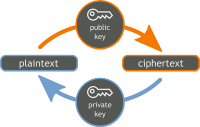-
Iran Revolutionary Guard hackers target State Department’s Iran-policy personnel
Hackers working for Iran’s Revolutionary Guards have in recent weeks intensified their hacking campaign against e-mail and social media accounts of Obama administration officials. U.S. officials say they believe the cyberattacks are linked to the arrest in Tehran of an Iranian-American businessman. The cyberattacks appear to target people working on Iran policy, with many of attacks focusing on personnel in the State Department’s Office of Iranian Affairs and the Bureau of Near Eastern Affairs.
-
-
NSF highlights more than forty years of supporting cybersecurity research and education

New report highlights NSF-funded cybersecurity research and education. Today, NSF invests nearly $160 million each year in interdisciplinary research, education, and workforce development help protect national and personal security. This support helps scientists develop the tools, training, and people that will keep the nation safe and maintain online privacy.
-
-
Protecting vehicles from cyberattacks

The Department of Homeland Security (DHS) Science and Technology Directorate (S&T) has awarded two grants for the development of technologies that can help defend government and privately owned vehicles from cyberattacks. “Modern vehicles are no longer purely mechanical systems,” said Dr. Dan Massey, S&T Cyber Physical Systems Security (CPSSEC) Program Manager. “Today’s vehicles have interdependent cyber components used for telematics, conveniences, and safety-critical systems. A stealthy adversary could gain access to a vehicle’s cyber components and remain completely hidden until initiating a widespread attack.”
-
-
Researching cyber vulnerabilities in computer-controlled cars may violate copyright law
The advent of computer controlled, Internet-capable vehicles is offering fertile new ground to hackers. Groups of “white hat” hackers have already demonstrated the vulnerabilities inherent in the new cars’ computer systems – by taking control over a car from ten miles away. One problem in addressing the issue is that the control software is proprietary, and is owned by the developers, and researching it to uncover flaws may be a violation of copyright laws.
-
-
Vulnerabilities found in use of certificates for Web security

Consumers use the Internet for banking, e-mailing, shopping, and much more nowadays. With so much personal and private information being transmitted over the Web, Internet users must be able to rely on and trust the sites they are accessing. For security purposes, Web sites use certificates to establish encrypted communications. When a site becomes compromised, its certificate should be revoked. Astudy finds that Web site administrators are providing a large number of revoked certificates, certificate authorities are not using newer processes for distributing revocations, and Web browsers are not checking whether certificates have been revoked.
-
-
Identifying students cognitively equipped to succeed in cybersecurity
The University of Maryland Center for Advanced Study of Language (CASL) will partner with the U.S. Air Force to conduct a two-year study designed to advance the cyber workforce. The Air Force says that by assessing abilities rather than knowledge, it will broaden its cyber pipeline while improving outcomes and maintaining a highly skilled workforce.
-
-
Better understanding of how computer users detect malware and phishing attacks
Detecting malware and phishing attacks are user-centered functions, but little is understood about the user behavior underlying these tasks. Researchers have conducted a study that provides new insights on users’ susceptibility to, and capability to detect, cyber-criminal attacks such as malware and phishing attacks. The study analyzed users’ brain activity and eye gaze movements as they were subjected to these attacks.
-
-
Amendment to CISA: U.S. courts could pursue foreigners for crimes abroad against other foreigners
A controversial amendment to an already-controversial cybersecurity bill will allow U.S. courts to pursue, convict, and jail foreign nationals in cases in which these foreigners committed crimes against other foreigners on foreign soil. The amendment to the Cybersecurity Information Sharing Act (CISA) cleared a key Senate hurdle on Thursday. It aims to lower the barrier for prosecuting crimes committed abroad.
-
-
EFF leads privacy advocates in opposing CISA
Privacy advocates have intensified their campaign against the Cybersecurity Information Sharing Act (CISA), which the Senate will vote on sometime next week. The Electronic Frontier Foundation (EFF) says it vehemently opposes the bill, as well as amendments which would expand the Computer Fraud and Abuse Act. EFF says that CISA is fundamentally flawed. The bill’s broad immunity clauses, vague definitions, and what EFF describes as “aggressive spying powers” combine to “make the bill a surveillance bill in disguise.”
-
-
New tool allows users to see how their personal information is used on the Web
Navigating the Web gets easier by the day as corporate monitoring of our e-mails and browsing habits fine-tune the algorithms that serve us personalized ads and recommendations. But convenience comes at a cost. In the wrong hands, our personal information can be used against us, to discriminate on housing and health insurance, and overcharge on goods and services, among other risks. “The Web is like the Wild West,” says one researcher. “There’s no oversight of how our data are being collected, exchanged and used.”
-
-
Identifying stealth attacks on complicated computer systems
Imagine millions of lines of instructions. Then try and picture how one extremely tiny anomaly could be found in almost real-time and prevent a cyber security attack. A trio of Virginia Tech computer scientists has tested their “program anomaly detection approach” against many real-world attacks.
-
-
Cyberthreats, cyberattattacks will only increase over time: Experts
The increasing dependency of a growing number of organizations on the Internet has served to increase the number of targets for hackers, particularly those organizations that have not given adequate attention to securing their network as they should. Even those networks not connected to the Internet are not immune from penetration by hackers. This is a threat that shows no sign of ever slowing down. More likely it will only increase over time, as cyber-capabilities are developed by more and more entities.
-
-
Guarding networks from “insider threats”
Even the best-protected, most sensitive computer networks resemble castles: They have walls to ward off outside threats, but their interiors are full of weak points. This is why the “insider threat” — someone within a system who, out of malice or naiveté puts a system at risk - -is considered one of the most serious risks in the cybersecurity world. “The insider threat is clearly a challenge for organizations, because most countermeasures were developed for external attacks,” says one researcher.
-
-
Grid Security Conference focuses on information sharing among stakeholders
More than 300 industry and federal partners are participating in the North American Electric Reliability Corporation’s (NERC) annual grid security conference, or GridSecCon, in Philadelphia, which opened on Wednesday and ends today. The conference is focusing on key cyber and physical security issues and training for enhancing the security and resiliency of the North American bulk power system. Topics of panel discussions include upgrades to NERC’s E-ISAC, cyber and physical security technology options, the transition to Version 5 of NERC’s critical infrastructure protection standards; and expectations for NERC’s third grid security exercise, GridEx III, which takes place 18-19 November.
-
-
Improve cybersecurity in energy delivery
Cyber networks support many important functions within energy delivery systems, from sending data between a smart meter and utility to controlling oil or gas flow in a pipeline. However, they are vulnerable to disturbances. According to the ICS-CERT Monitor, a publication of the U.S. Department of Homeland Security, a third of the 245 reported cyber incidents in industrial control systems that happened in 2014 occurred in the energy sector. The U.S. Department of Energy (DoE) initiative awards $28.1million to a consortium of eleven universities and research organizations, with the goal of improving computer/communication networks for energy delivery systems like power grids and pipelines.
-
More headlines
The long view
Ransomware Attacks: Death Threats, Endangered Patients and Millions of Dollars in Damages
A ransomware attack on Change Healthcare, a company that processes 15 billion health care transactions annually and deals with 1 in 3 patient records in the United States, is continuing to cause massive disruptions nearly three weeks later. The incident, which started on February 21, has been called the “most significant cyberattack on the U.S. health care system” by the American Hospital Association. It is just the latest example of an increasing trend.
Chinese Government Hackers Targeted Critics of China, U.S. Businesses and Politicians
An indictment was unsealed Monday charging seven nationals of the People’s Republic of China (PRC) with conspiracy to commit computer intrusions and conspiracy to commit wire fraud for their involvement in a PRC-based hacking group that spent approximately 14 years targeting U.S. and foreign critics, businesses, and political officials in furtherance of the PRC’s economic espionage and foreign intelligence objectives.
Autonomous Vehicle Technology Vulnerable to Road Object Spoofing and Vanishing Attacks
Researchers have demonstrated the potentially hazardous vulnerabilities associated with the technology called LiDAR, or Light Detection and Ranging, many autonomous vehicles use to navigate streets, roads and highways. The researchers have shown how to use lasers to fool LiDAR into “seeing” objects that are not present and missing those that are – deficiencies that can cause unwarranted and unsafe braking or collisions.
